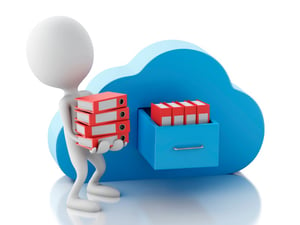If you are like thousands of medium sized bus inesses across the globe, you may be evaluating opportunities to “go paperless.” Recent mid-market surveys indicate that document management is ranked in the top five IT initiatives being undertaken. Whatever your reason, you can properly evaluate the myriad document management solutions available in the market by asking the right questions. The following three considerations will guide you through the vendor selection process and ensure that you make the best decision for your organization. This blog is a repost from Altec-Inc.
inesses across the globe, you may be evaluating opportunities to “go paperless.” Recent mid-market surveys indicate that document management is ranked in the top five IT initiatives being undertaken. Whatever your reason, you can properly evaluate the myriad document management solutions available in the market by asking the right questions. The following three considerations will guide you through the vendor selection process and ensure that you make the best decision for your organization. This blog is a repost from Altec-Inc.
1. Is the document management solution fully integrated?
Document management systems integrated with an ERP provide the greatest productivity gains and strongest ROI. However, not all integrations are created equal.
The most common integrations between document management solutions and ERP software are the synchronization of the two systems and the abilities to automatically index and view documents, with their data, from the accounting application. Some integrations require manual indexing after the document has been processed and scanned. With those systems, you don’t get the benefit of digitizing documents up front and thus miss out on the opportunity to streamline processes. Other integrations automate the entire data entry process by launching the workflow functionality and moving the document to the next workflow status when the transaction is saved. This helps streamline the process and increase overall efficiencies.
During software evaluations, be sure that the vendor can actually demonstrate the depth and completeness of the integration. And ask the following questions:
- Does it actually streamline the process or does it just file our documents after the process is complete?
- Does it automatically index documents for future retrieval?
- Does it allow quick and easy access to our documents?
2. How extensible and scalable is the document management solution?
There are four main areas of consideration when it comes to extensibility and scalability:
Architecture: Many companies today prefer non-proprietary systems. In document management, this means that the system should store documents in their original formats and run on a range of hardware.
Configurability: Because their function is so central to everyday operations, the system you choose should be configurable to match your business processes. The supplier should be able to integrate the system into applications used today.
Scalability: The system needs to be able to grow with your organization, both in terms of how many users it supports and how many documents it can handle.
Modularity: In the best-case scenario, you should be able to buy only the functionality needed and add more as you expand your use of the system.
As you look at document management solutions, keep the aforementioned areas in mind as you ask these questions:
- Can the document management solution integrate with other systems (besides our accounting application)?
- Can we use the document management system for other types of documents? If so, how easy is it to set up new documents in the system?
- How are the documents stored? (Make sure the documents are not stored in a proprietary format. Scanned and ERM-captured documents are stored as Group IV TIFs, which is an industry standard.)
- Are documents stored in the SQL database or in the file system?
- What happens when we need to add more storage? Is it transparent to the user?
- What kind of volumes can the document management system support?
3. What should a company expect to pay?
Document management systems can be a significant expense; however, most well-designed and implemented document management solutions will provide a payback in less than 12 months. Remember that costs for a document management system will vary tremendously depending on the features and integration work required. To keep costs down and minimize risks, you should consider an industry leader with a proven integration methodology; look for certifications and endorsements that are credible in your industry and marketplace and ask for costs to be clearly broken down for software, services, support and maintenance.
Sage ERP Document Management is the Sage Endorsed document management and workflow solution that electronically captures documents and automates any business process through workflow, resulting in regained time (previously lost to antiquated practices and misfiled documents) and money saved. For more information on going paperless, let us know. RKL eSolutions can help you start your paperless migration in the smoothest and most efficient manner possible.
Webinar: Sage ERP Document Management: A Day in the Life of a Paperless Office
When: Tuesday, May 17th | 2pm est, 11am pst


